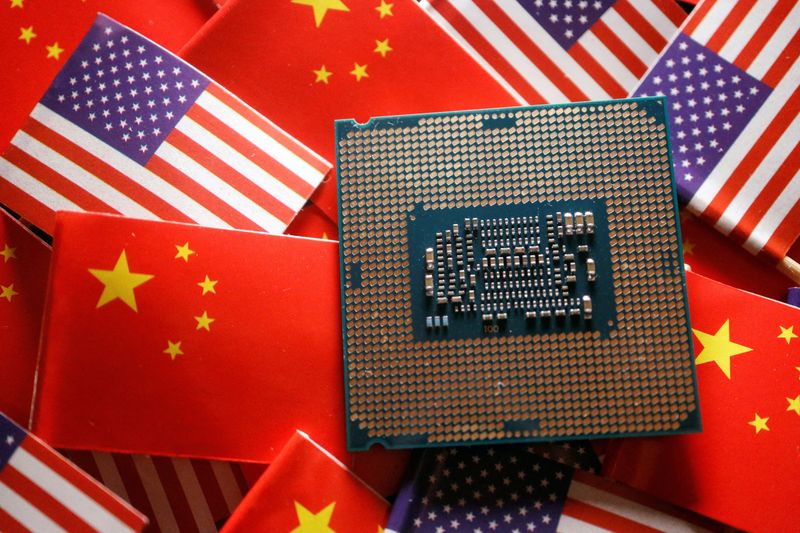By Kane Wu and Michael Martina
HONG KONG/WASHINGTON (Reuters) -President Joe Biden's move to prohibit some U.S. technology investments in China is expected to keep investors on the sidelines, concerned that tougher measures are ahead as tensions simmer between the world's two biggest economies.
U.S. private equity and venture capital investors have already hit the brakes on sensitive technologies in China as relations have worsened since the administration of Biden's predecessor, Donald Trump, over issues from tech to China's industrial policies to national security.
Aiming to keep U.S. capital and expertise from helping China's military modernisation and harming U.S. national security, Biden's executive order on Wednesday was limited, for example by applying only to new investments.
But it will not be the end of measures to tighten scrutiny of American investments in China, which is struggling to get back on its feet since the COVID-19 pandemic, dealmakers and analysts say.
The order authorises the Treasury secretary to prohibit or restrict U.S. investments in Chinese firms in semiconductors and microelectronics, quantum information technologies and certain artificial intelligence systems.
Congress may introduce legislation expanding on Biden's restrictions, said Weiheng Chen, senior partner and head of Greater China practice at law firm Wilson Sonsini.
Indeed, congressional Republicans immediately criticised the order by Democrat Biden as not going far enough.
"Certain U.S. investors may just choose to wait for the implementation rules before making investment decisions in these covered sectors," Chen said.
SHIFT TO YUAN
Acquisitions of Chinese companies by U.S. firms have sunk almost 60% so far this year to $3.5 billion from $8.8 billion for the same period last year, according to Dealogic data, while deal value in the tech sector has plunged to $815 from $6.1 billion.
China-U.S. tensions and Beijing's regulatory crackdown on its private enterprises have prompted many fund managers to pivot from the country or shift to local-currency investments.
"The situation is already very bad for dollar-based funds to invest in China's tech sector. There isn't much room for things to get worse," said Beijing-based China Growth Capital partner Wayne Shiong.
Biden's move will likely make China-focussed venture capital firms feel more urgency to raise yuan funds from Chinese investors, he said.
The executive order and the prospects of a pause in private equity investments in China across the board come as Beijing seeks to attract capital to revive its slowing economy.
Pan Yuan, a researcher at the Chinese Academy of Social Sciences, a top government think tank, said despite Biden's restrictions, China will maintain an open policy to attract foreign capital.
To counter the U.S. curbs, China must focus on improving its domestic technology capabilities, Pan said.
TECH DISPUTES
China hawks in Washington blame American investors for transferring capital and valuable know-how to Chinese technology companies that could help advance Beijing's military capabilities. Beijing, for its part, has been seeking self-sufficiency in the escalating tech disputes.
On Monday, Hua Hong Semiconductor, China's number two chip foundry, made its Shanghai market debut, raising $3 billion and joining a long queue of local chipmakers to tap the stock market to fund expansion.
In response to Biden's executive order, China's commerce ministry said it was "gravely concerned" and reserved the right to take countermeasures.
Analysts said, however, Beijing's retaliation options are limited and would unlikely escalate the matter, especially given tight scrutiny since the Trump era.

"The main Chinese reaction will be to discourage other countries from copying American actions," said Derek Scissors, senior fellow and expert on U.S.-China economic relations at the pro-business American Enterprise Institute.
"China could act in non-reciprocal fashion, retaliating somewhere other than on the investment side. But the executive order is barely going to do anything, and China escalating would risk turning a molehill into a mountain."